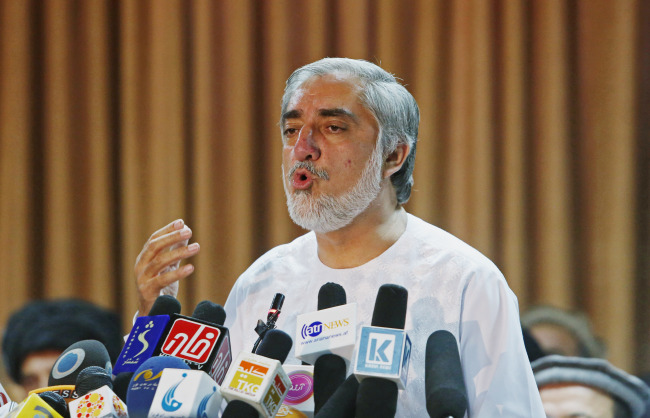KABUL (AFP) ― Afghan presidential candidate Abdullah Abdullah was set to reject preliminary election results released on Monday, heightening a political crisis over fraud that threatens to trigger instability as U.S.-led troops pull out.
Abdullah, previously seen as the election front-runner, alleges that he was the victim of “industrial-scale” ballot-box stuffing on June 14 and has vowed not to recognize the vote count.
His poll rival Ashraf Ghani, who was reported to be at least one million votes ahead, says the result is fair and must not be further delayed.
The Independent Election Commission will hold a press conference at 2 p.m. (0930 GMT) to announce the winner after a five-day delay.
The United Nations and Afghanistan’s international backers had lobbied hard to try to ensure a smooth election process, but the contested outcome could realise their worst fears and raises the risk of civil unrest.
Influential U.S. Sen. Carl Levin, on a visit to Kabul, told reporters on Sunday that the preliminary result would likely be followed by an audit of suspicious votes in an attempt to assuage Abdullah’s fears of fraud.
“I expect that (there) is going to be an agreement on a comprehensive audit,” Levin, chairman of the Senate committee on armed services, said.
“We have assurances (the candidates) will accept the outcome of such an audit.”
Abdullah, previously seen as the election front-runner, alleges that he was the victim of “industrial-scale” ballot-box stuffing on June 14 and has vowed not to recognize the vote count.
His poll rival Ashraf Ghani, who was reported to be at least one million votes ahead, says the result is fair and must not be further delayed.
The Independent Election Commission will hold a press conference at 2 p.m. (0930 GMT) to announce the winner after a five-day delay.
The United Nations and Afghanistan’s international backers had lobbied hard to try to ensure a smooth election process, but the contested outcome could realise their worst fears and raises the risk of civil unrest.
Influential U.S. Sen. Carl Levin, on a visit to Kabul, told reporters on Sunday that the preliminary result would likely be followed by an audit of suspicious votes in an attempt to assuage Abdullah’s fears of fraud.
“I expect that (there) is going to be an agreement on a comprehensive audit,” Levin, chairman of the Senate committee on armed services, said.
“We have assurances (the candidates) will accept the outcome of such an audit.”

After the preliminary result on Monday, the official result is scheduled for July 24 after a period for adjudication of complaints.
The deadlock has tipped Afghanistan’s first democratic transfer of power into chaos as U.S.-led troops end their 13-year war against the Taliban, and the country faces a new era with declining civilian aid.
“What we are asking for is thorough auditing, then preliminary results afterward,” Abdullah told supporters in Kabul late Sunday.
“We are honored to claim that we are the majority of votes in Afghanistan that are clean.”
Ghani’s team said that further delays were unacceptable.
“This is a red line for us,” Azita Rafhat, a Ghani spokeswoman, said.
“People want to know the result of their votes.”
Afghanistan has been battered by decades of conflict, and any power struggle would undermine claims that the costly U.S.-led military and civilian mission has helped to establish a functioning state.
It could also threaten billions of dollars of aid pledges, and boost the insurgents.
The government on Sunday rejected a proposal to ban Facebook during the impasse despite fears that social media postings have fanned ethnic hatred.
Ghani attracts much of his support from the Pashtun tribes of the south and east, while Abdullah’s loyalists are Tajiks and other northern Afghan groups ― echoing the ethnic divisions of the bloody 1992-1996 civil war.
The United Nations mission in Afghanistan has highlighted the risk of political tensions spilling over into violence, though protests have so far been peaceful.
President Hamid Karzai, who has ruled since the fall of the Taliban in 2001, is constitutionally barred from a third term in office, and he has not publicly endorsed any candidate.
With NATO’s combat mission ending, the summer has been a major test of the fledgling Afghan government forces, who have been fighting back in the southern province of Helmand after a major Taliban offensive last month.
All foreign combat troops will leave Afghanistan by December, with about 10,000 U.S. troops staying into next year if the new president signs a security deal with Washington.
-
Articles by Korea Herald







![[Graphic News] More Koreans say they plan long-distance trips this year](http://res.heraldm.com/phpwas/restmb_idxmake.php?idx=644&simg=/content/image/2024/04/17/20240417050828_0.gif&u=)
![[KH Explains] Hyundai's full hybrid edge to pay off amid slow transition to pure EVs](http://res.heraldm.com/phpwas/restmb_idxmake.php?idx=644&simg=/content/image/2024/04/18/20240418050645_0.jpg&u=20240419100350)






![[From the Scene] Monks, Buddhists hail return of remains of Buddhas](http://res.heraldm.com/phpwas/restmb_idxmake.php?idx=652&simg=/content/image/2024/04/19/20240419050617_0.jpg&u=20240419175937)

![[KH Explains] Hyundai's full hybrid edge to pay off amid slow transition to pure EVs](http://res.heraldm.com/phpwas/restmb_idxmake.php?idx=652&simg=/content/image/2024/04/18/20240418050645_0.jpg&u=20240419100350)

![[Today’s K-pop] Illit drops debut single remix](http://res.heraldm.com/phpwas/restmb_idxmake.php?idx=642&simg=/content/image/2024/04/19/20240419050612_0.jpg&u=)